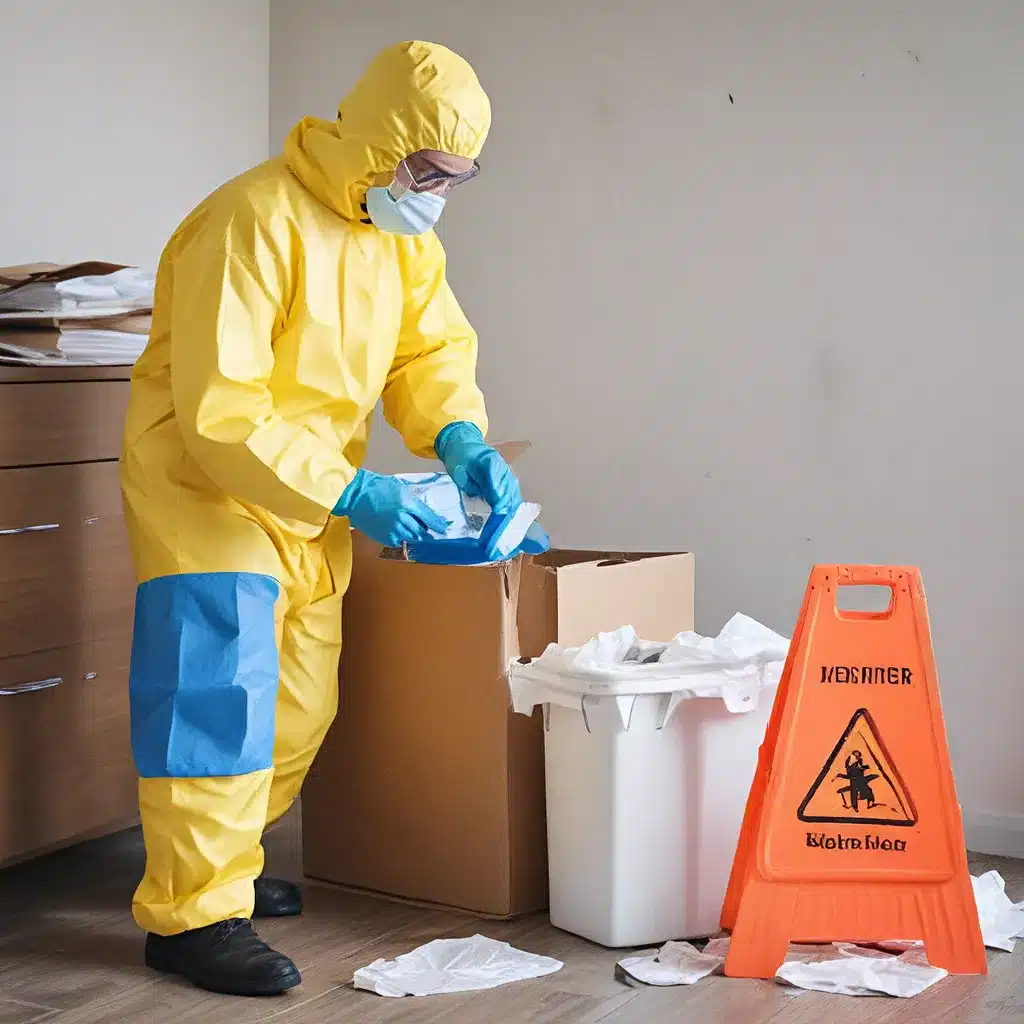When it comes to managing medical waste at home, it’s crucial to handle it with the utmost care and caution. As someone who’s dealt with a fair share of medical issues myself, I know firsthand how daunting it can be to navigate the intricacies of proper waste disposal. But fear not, my friends – I’m here to share some expert guidance that will have you feeling like a pro in no time.
Understanding Medical Waste
Let’s start with the basics. Medical waste is any solid waste that’s generated during the diagnosis, treatment, or immunization of humans or animals. This includes things like used needles, bandages, and laboratory samples. While it may not seem like a big deal, improper disposal of these items can pose serious health and environmental risks.
One of the key things to remember is that regulated medical waste is a subset of medical waste that requires special treatment. This includes things like blood, body fluids, and microbiological waste. These materials need to be handled with extra care and must be treated before they can be safely disposed of.
Handling Sharps
When it comes to dealing with sharps, such as needles and scalpel blades, it’s crucial to take the proper precautions. These items can be deadly if they’re not handled correctly, so don’t mess around.
The medical waste management rules state that sharps must be placed in a rigid, leak-proof, and puncture-resistant container before being disposed of. This helps to ensure that they don’t pose a threat to anyone who comes into contact with them.
Now, I know what you’re thinking – “But where the heck do I even find a container like that?” Well, my friend, you’re in luck. Many pharmacies and healthcare facilities offer free sharps containers for folks like us who need to dispose of this kind of waste. All you have to do is ask, and they’ll hook you up.
Dealing with Blood and Body Fluids
When it comes to blood and body fluids, the rules are a bit more complicated. These materials are considered regulated medical waste, which means they need to be treated before they can be disposed of.
According to the North Carolina Department of Environmental Quality, acceptable treatment methods for blood and body fluids include incineration or disposal in the sanitary sewer system. Now, I know what you’re thinking – “But I’m not running a medical facility, so how the heck am I supposed to incinerate my waste?” Don’t worry, my friend, there’s a simpler solution.
If you have small amounts of blood or body fluids, you can actually just dispose of them in the regular trash. Just make sure they’re in a sealed container first, and you’re good to go. But if you’ve got larger volumes, you may want to consider flushing them down the toilet instead. Just be sure to check with your local water treatment plant to make sure that’s okay.
Disposing of Other Medical Waste
Now, not all medical waste is considered regulated. Things like used bandages, gloves, and dressings can generally be disposed of in your regular household trash. Just be sure to place them in a sealed bag or container first to prevent any leaks or spills.
According to the California Department of Public Health, the key is to ensure that your medical waste is properly contained before it leaves your home. This helps to protect both you and the people who handle the waste downstream.
Staying Safe and Compliant
Throughout this whole process, it’s important to remember that your safety is the top priority. Always wear gloves when handling medical waste, and be sure to wash your hands thoroughly afterwards. And remember, if you’re ever unsure about how to dispose of something, it’s always better to err on the side of caution.
The Florida Department of Health has a handy hotline (1-833-4CA4ALL) that you can call if you have any questions or concerns about medical waste disposal. They’re there to help, so don’t be afraid to reach out.
And let’s not forget about the legal stuff, either. The medical waste management rules are in place to protect all of us, so it’s important to make sure you’re following them to the letter. Failure to do so can result in some pretty hefty fines and penalties, so it’s just not worth the risk.
The Bottom Line
At the end of the day, proper medical waste disposal isn’t just about compliance – it’s about responsibility. By taking the time to handle these materials with care, we’re not only protecting ourselves and our loved ones, but also the entire community.
So, the next time you’ve got some medical waste on your hands, don’t panic. Just remember the expert guidance you’ve learned here today, and you’ll be on your way to becoming a medical waste disposal superstar. And who knows, maybe you’ll even inspire your neighbors to follow suit. After all, we’re all in this together, right?
Now, if you’ll excuse me, I’ve got some sharps to dispose of. Happy cleaning, my friends!







